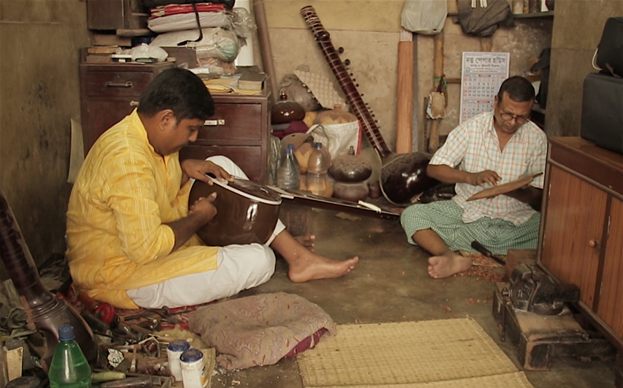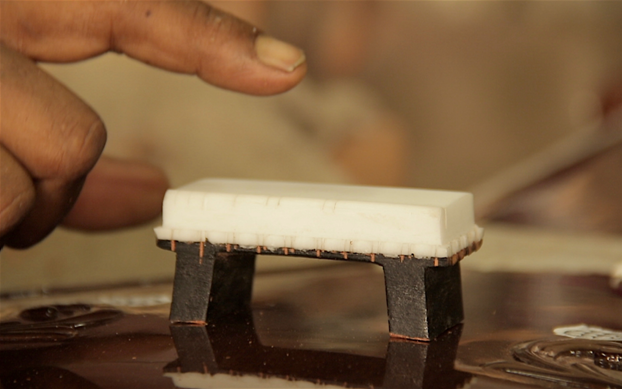One of the most popular Indian classical instruments, the Sitar has a rich and complex heritage. Having its origin dated back to the ancient Veena, the Sitar has been in use for more than seven centuries and has gained the prominence in the royal court of the Mughal Empire in India. Believed to have been invented by a musician Amir Khusrow (the namesake of famous Sufi musician and poet), the crafting process of this instrument is of thoroughly a complex one. It has always been constructed by proficient Sitar ‘makers’.
 Among the most accomplished Sitar makers in India at present, the P & Brothers is a prominent name. Established by the late Sri Panchkori Karmakar, after whom the enterprise is named, his brother ran the business until his own early demise. The family tradition is now being continued by Panchkori’s nephew Sri Suman Karmakar. He is one of those rare makers in Kolkata now who generally does all the work, from crafting the instrument to finishing, from his shop. Suman is profoundly influenced by the legend Sri Hiren Roy in terms of tone and style and it also reflects in his instruments that emanate a dark, warmer sound. Compared to the instruments from other contemporary makers, Karmakar’s Sitars are heavier and massive in construction and traditional in fitting, rendering them one of the most unique and impressive Sitars crafted in Kolkata.
Among the most accomplished Sitar makers in India at present, the P & Brothers is a prominent name. Established by the late Sri Panchkori Karmakar, after whom the enterprise is named, his brother ran the business until his own early demise. The family tradition is now being continued by Panchkori’s nephew Sri Suman Karmakar. He is one of those rare makers in Kolkata now who generally does all the work, from crafting the instrument to finishing, from his shop. Suman is profoundly influenced by the legend Sri Hiren Roy in terms of tone and style and it also reflects in his instruments that emanate a dark, warmer sound. Compared to the instruments from other contemporary makers, Karmakar’s Sitars are heavier and massive in construction and traditional in fitting, rendering them one of the most unique and impressive Sitars crafted in Kolkata.
 Suman Karmakar explicitly talks about the present scenario of the Sitar makers. In addition to an already serious dearth of skilled labour in this line of work, according to him, they suffer an abject poverty of appreciation as well. Suman recounts how his paternal uncle, the late Panchkori Karmakar, gave him the theoretical understanding of the work and how the works of his father and of the other makers have influenced his perception of ‘making’ in the long run. He also speaks about how things have changed in the last three decades since his father used to design the instrument. Karmakar explains why he does not want his son to join this profession that is so teeming with uncertainty and hardships. In this video, Sri Sunil Kumar Singha, a senior colleague of Karmakar’s, candidly asserts that he has been doing this job for almost forty years solely to earn his livelihood, having no special attachment to music or the exquisiteness of the instrument. Having worked on a wide range of instruments, Singha is skeptical about teaching the craftsmanship to the next generation since he believes this is a field where the educated community would never enter and the lack of qualified artisans is only likely to intensify. From his experience, he also discusses the deep complications of this profession, which reveal the true picture of the Sitar makers in India today.
Suman Karmakar explicitly talks about the present scenario of the Sitar makers. In addition to an already serious dearth of skilled labour in this line of work, according to him, they suffer an abject poverty of appreciation as well. Suman recounts how his paternal uncle, the late Panchkori Karmakar, gave him the theoretical understanding of the work and how the works of his father and of the other makers have influenced his perception of ‘making’ in the long run. He also speaks about how things have changed in the last three decades since his father used to design the instrument. Karmakar explains why he does not want his son to join this profession that is so teeming with uncertainty and hardships. In this video, Sri Sunil Kumar Singha, a senior colleague of Karmakar’s, candidly asserts that he has been doing this job for almost forty years solely to earn his livelihood, having no special attachment to music or the exquisiteness of the instrument. Having worked on a wide range of instruments, Singha is skeptical about teaching the craftsmanship to the next generation since he believes this is a field where the educated community would never enter and the lack of qualified artisans is only likely to intensify. From his experience, he also discusses the deep complications of this profession, which reveal the true picture of the Sitar makers in India today.